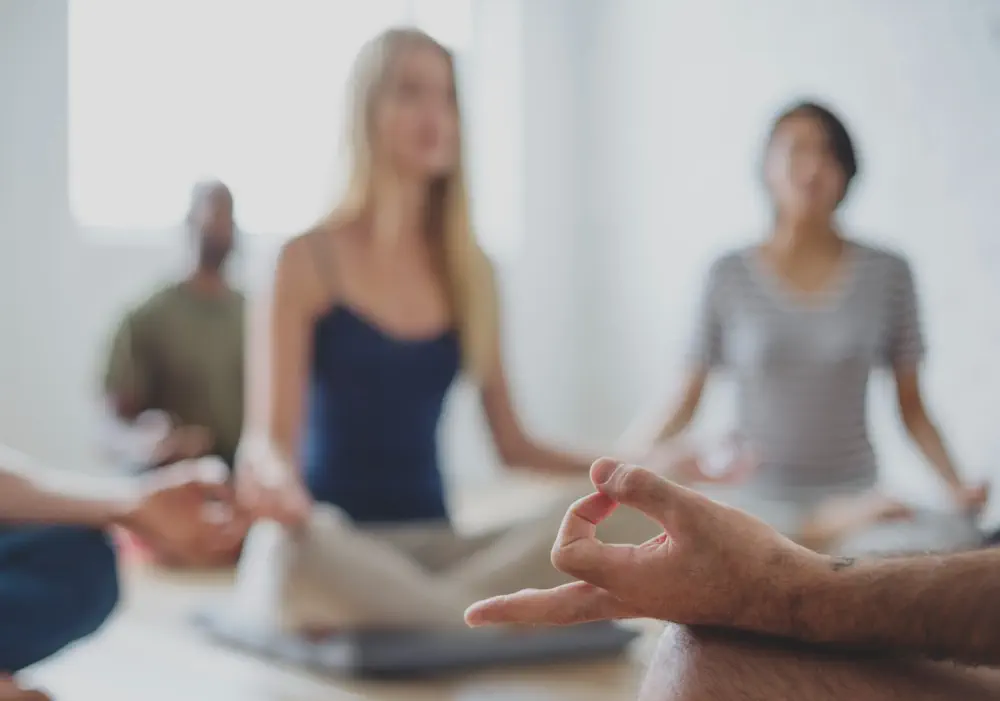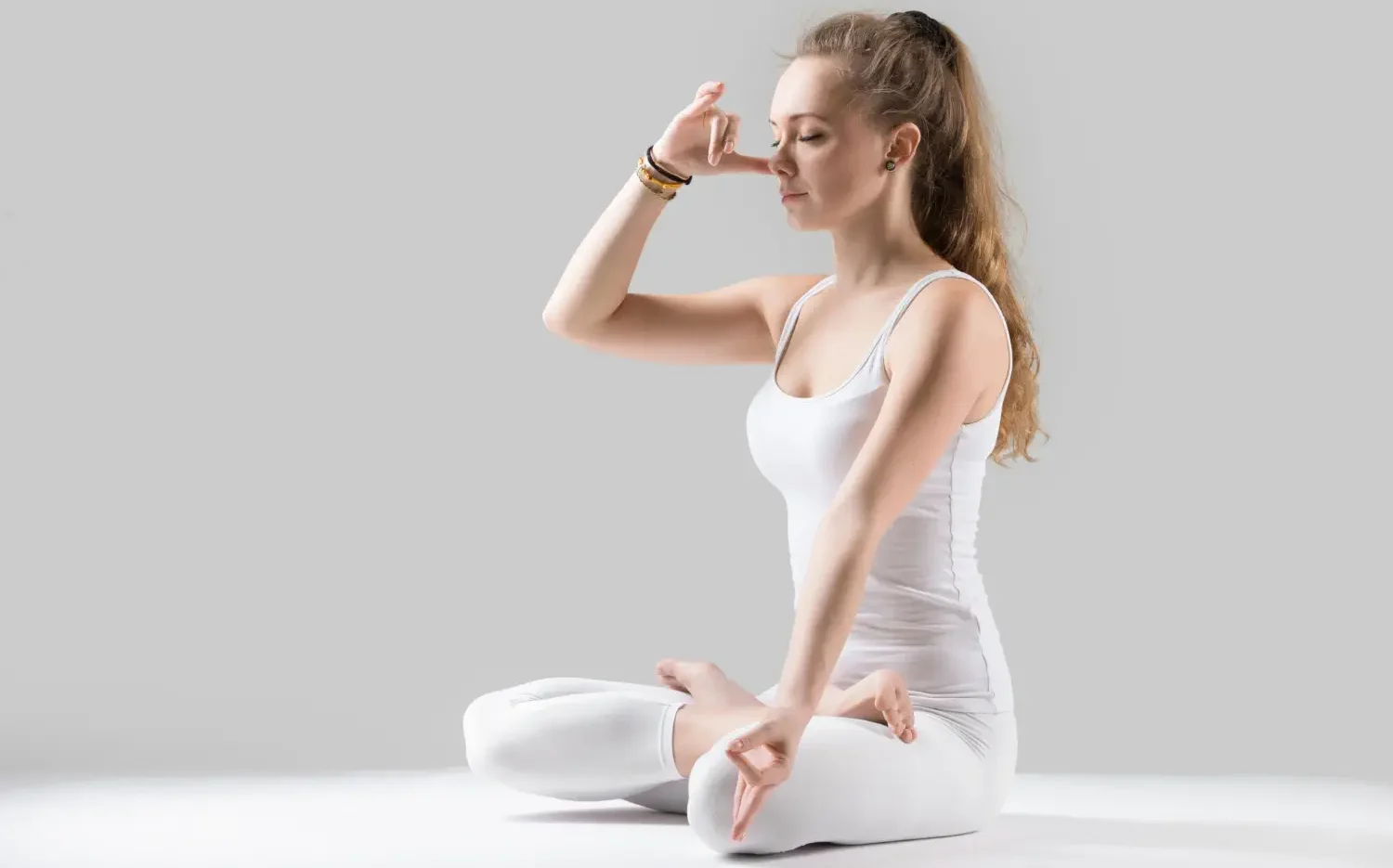We offer medical detox and multiple addiction treatment options in our
luxury treatment centres in Port Hope, Cobourg, and Ottawa.
Different Meditation Techniques for Overcoming Addiction
What could meditation have to do with your cycle of addiction? Chances are, you’ve heard of meditation before, but you may think it’s only for spiritual or religious people, or even maybe hippies. Engaging in this form of musing or introspection has been proven extremely beneficial in preventing relapses. Let’s see how meditation for addiction recovery can add to your rehabilitation and wellness toolbox!
Key takeaway:
- Meditation Rebuilds Neural Connections: How meditation taps into neuroplasticity to repair brain functions impacted by addiction, empowering you to regain control over your emotions and decisions
- Improves Stress and Emotional Regulation: Regular meditation practice not only lowers your stress levels but also improves emotional regulation, making it a powerful tool for managing the ups and downs of recovery.
- Effective for Craving Management: How meditation helps you observe cravings and tough emotions without acting on them, enabling you to overcome urges and keep your recovery on track
- Supports Mental Health: How this simple practice can drastically reduce symptoms of anxiety, depression, and PTSD, while building your inner strength to handle recovery’s challenges
- Complementary to Traditional Treatments: How meditation complements traditional therapies like CBT, enhancing your emotional stability and strengthening your commitment to long-term sobriety
Why Use Meditation in Recovery?
Can meditation help with addiction? Scientific studies confirm its effectiveness as a practical recovery tool. Substance use disorders disrupt brain circuits that control decision-making and impulse regulation. Meditation for addiction rebuilds these neural connections through neuroplasticity, restoring your ability to manage emotions and make conscious choices.
The practice teaches you to observe cravings and difficult thoughts without automatically acting on them. You develop what neuroscientists call "response flexibility"—the space between stimulus and reaction where healthy decisions happen. This mental training becomes especially valuable when dealing with meditation for alcohol addiction or other substance dependencies.
Mindfulness techniques for addiction offer unmatched convenience. You can practise anywhere, anytime, without cost or special equipment. When cravings strike at midnight or stress builds during your workday, this portable coping skill remains instantly available to support your recovery.
The Benefits of Meditation
Numerous studies have confirmed the positive impact of meditation on mental and physical health. To give you a little bit of science, meditation activates the prefrontal cortex, which liberates endorphins (that natural feel-good chemical) and regulates neurotransmitters, leaving you relaxed and buoyant with a better brace on the present moment.
Scientific evidence supporting contemplative practices for addiction recovery proves both extensive and compelling. When you practise meditation regularly, you're literally reshaping your brain in ways that support long-term sobriety and overall wellbeing.
Neurological Benefits
Meditation for addiction activates your prefrontal cortex—the brain's CEO responsible for decision-making, planning, and impulse control. This enhanced prefrontal function liberates endorphins (your body's natural feel-good chemicals) and regulates neurotransmitters, leaving you more relaxed and better equipped to handle present-moment challenges.
Studies using neuroimaging reveal that consistent meditation practice also impacts the amygdala, reducing fear responses while increasing activation in the anterior cingulate cortex, which governs motivation and motor control. This neurological remodelling directly counters the brain changes caused by addiction.
Stress and Emotional Regulation
The link between stress and substance use is well-documented—stress increases the likelihood of drug and alcohol use and often precipitates relapses. Recovery meditations address this by fundamentally altering your stress response system.
Regular practice increases heart rate variability (HRV), which reflects your capacity to self-regulate stress. Research demonstrates that people practising mindful techniques for alcohol dependency achieve significantly greater HRV recovery from stress-primed alcohol cues compared to those receiving standard treatment alone.
Additionally, meditation reduces cortisol levels—your body's primary stress hormone. Lower cortisol levels mean less anxiety, better sleep, improved mood regulation, and reduced inflammation throughout the body.
Craving Management and Relapse Prevention
Do meditative practices help with addiction cravings? Multiple studies confirm they can. Recovery-focused meditation teaches you to observe cravings without automatically acting on them. You learn that cravings, like all mental states, are temporary and will pass if you don't feed them with action.
One particularly powerful aspect is meditation's ability to enhance your sensitivity to natural pleasures and rewards. As your brain becomes more responsive to healthy activities—like connecting with friends, enjoying nature, or celebrating small victories—the artificial highs from substances become less appealing.

Mental Health Improvements
Meditation for addiction offers significant benefits for co-occurring mental health conditions. Regular practitioners report reduced symptoms of:
- Depression and anxiety
- Post-traumatic stress disorder
- Insomnia and sleep disturbances
- Chronic pain
- Negative self-talk and shame
The practice fosters self-compassion and emotional resilience, helping you navigate the inevitable ups and downs of recovery with greater stability and confidence.
Enhanced Treatment Outcomes
Meditative practices for addiction recovery complement traditional addiction treatments beautifully. When combined with cognitive-behavioural therapy (CBT), meditation reinforces the focus on behavioural awareness and change. It supports group therapy by improving your ability to stay present and engaged, and it enhances family therapy by helping you regulate emotions during difficult conversations.
Research demonstrates that mindfulness-based interventions show significant improvements in treatment outcomes, with studies indicating reduced relapse rates and better long-term recovery success when meditation is integrated with standard addiction treatment approaches.
Important Considerations for Including Meditation in Addiction Recovery
These mind and body benefits, unfortunately, do not happen overnight. For meditation to work, you need to commit to it on a regular basis and as a long-term exercise. You’ll slowly begin to understand how it works for you and will be able to tailor it to your recovery needs.
The biggest advantage of meditation is the fact that it can be done at any time you desire and in any place you are comfortable. It’s also completely free, and you don’t need tools or anyone else unless you desire to work with a coach or a group.
Types of Meditation for Addiction Recovery
Substance abuse often leaves you feeling disconnected from your body and trapped in destructive thought patterns. Meditation for addiction recovery counteracts this disconnection through various approaches, each offering unique benefits for your healing journey. Here are five powerful techniques proven effective for addiction recovery:
1. Mindfulness Meditation
Mindfulness meditation stands as the most scientifically studied and widely recommended form of meditation for addiction recovery, particularly beneficial for those in early sobriety. This foundational practice involves cultivating a non-judgmental, non-reactive awareness of your present-moment experience, including thoughts, feelings, sensations, and perceptions.
To practise mindfulness meditation, find a comfortable position and focus your attention on what you're experiencing right now. When thoughts about the past or future arise, gently redirect your attention back to the present moment. You're not trying to stop thoughts or change feelings—you're simply observing them with curiosity and compassion.
This technique proves especially valuable for recovery-centred meditation because it builds the crucial skill of "urge surfing"—learning to ride out cravings and difficult emotions without acting on them impulsively.
2. Breathing Meditation (Pranayama)
Breathing meditation places your entire focus on the breath—your most reliable anchor to the present moment. As you concentrate on inhalations and exhalations, your conscious mind settles into a natural rhythm that calms both body and mind.
Different traditions offer various breathing techniques. In Zen meditation (Zazen), you might count breaths from one to ten and begin again. Kundalini practices incorporate specific breathing patterns to move energy through the body. Regardless of the specific technique, all breathing meditations help regulate your nervous system and provide immediate stress relief.
For those practising mindful approaches to alcohol recovery, breathing techniques offer a powerful tool during moments of craving or emotional overwhelm. Deep, conscious breathing activates your parasympathetic nervous system, creating an immediate sense of calm and control.

3. Mantra Meditation
Mantra meditation involves the repetition of a simple word, phrase, or sound that serves as your point of focus. You can chant, speak, hum, or repeat your mantra silently. Popular mantras include "Om," "So Hum" (I am), or even personal affirmations like "I am free" or "I choose peace."
This technique is particularly beneficial for those whose minds tend to race or spiral into negative thinking patterns. The mantra gives your mind something constructive to focus on while breaking the cycle of obsessive thoughts about substances or past mistakes.
As you silently repeat your chosen mantra, your mind and body naturally settle into deeper states of relaxation, rest, and inner peace. Many people find this form of recovery meditation especially comforting during difficult periods of their healing journey.
4. Guided Meditation and Visualisation
Sometimes called guided imagery, this technique involves forming mental images of peaceful, healing situations while following along with recorded guidance or working with a meditation teacher. You might visualise yourself in nature, imagine healing light moving through your body, or picture yourself successfully navigating challenging situations while maintaining sobriety.
Guided meditation works particularly well for beginners who find it difficult to meditate alone. The external guidance helps keep your mind focused while you develop the skills needed for independent practice. Many people use apps, online videos, or attend group sessions to learn this approach.
For meditation for alcohol addiction, guided visualisations might include imagining yourself confidently declining drinks at social events or visualising your life filled with meaningful activities and relationships that support your recovery.
5. Movement Meditation (Walking Meditation and Mindful Movement)
Movement meditation combines mindfulness with gentle physical activity, making it perfect for those who struggle with traditional seated meditation. You can practise walking meditation indoors or outdoors, focusing on the sensation of your feet touching the ground, the rhythm of your steps, and the movement of your body through space.
Other forms include mindful yoga, tai chi, or simply bringing meditative awareness to daily activities like washing dishes or gardening. The key is maintaining present-moment awareness while engaging in slow, deliberate movement.
This approach proves especially valuable for people whose addiction involved sedentary behaviour or who experience restlessness during early recovery. Movement meditation helps reconnect you with your body in positive, nurturing ways while providing the mental benefits of traditional meditation.
Mindful practices for recovery incorporating movement also offer practical benefits—you can use walking meditation during lunch breaks, practice mindful stretching when feeling tense, or engage in meditative movement when traditional sitting feels too challenging.

The Canadian Centre for Addictions Is Here to Support You
Are you prepared to uncover how meditation for addiction can revolutionise your path to lasting sobriety? At the Canadian Centre for Addictions (CCFA), we understand that recovery involves healing your whole person—mind, body, and spirit. Recovery meditations form a crucial component of our comprehensive, evidence-based treatment approach.
Does meditation truly help with addiction in your specific situation? Our compassionate professionals will work with you to explore how different meditation techniques can support your individual recovery goals. From mindfulness-based relapse prevention to guided visualisation sessions, we offer a full spectrum of meditative approaches proven effective for long-term sobriety.
Throughout this process of meditation for addiction recovery, the CCFA remains available to support you at every stage. You can contact us at 1-855-383-3771 or browse our treatment programs on our website.
FAQ
Does meditation replace traditional addiction treatment?
No, meditation for addiction works best as a complementary practice alongside professional treatment, counselling, and medical support. While meditation offers significant benefits, it should enhance rather than replace structured addiction treatment programmes.
How long does it take to see benefits from meditation for addiction?
Many people notice some immediate calming effects from recovery-focused meditation, but lasting changes typically develop over weeks to months of consistent practice. Research shows that practising for at least 8 weeks creates measurable changes in brain structure and function.
Can meditation help with alcohol addiction specifically?
Yes, studies specifically examining meditation for alcohol addiction show promising results. Research indicates that mindfulness-based interventions can reduce alcohol cravings, improve stress management, and significantly decrease relapse rates compared to standard treatment alone.
What if I can't quiet my mind during meditation?
Having a busy mind during contemplative practices for addiction is completely normal and doesn't indicate you're doing anything wrong. The goal centres on noticing thoughts without getting caught up in them. Start with guided meditations or breathing techniques to help focus your attention.
How often should I practise recovery meditations?
For optimal benefits, aim to practise mindful techniques for recovery daily, even if only for 5-10 minutes initially. Consistency matters more than duration—a brief daily practice proves more beneficial than occasional longer sessions.
Are there any risks to meditation for people in recovery?
Contemplative practices for addiction are generally very safe, though people with trauma histories should work with qualified instructors initially. Some individuals may experience increased awareness of difficult emotions or physical sensations, which is why professional support remains important.
Can I use meditation apps for addiction recovery?
Many high-quality apps offer recovery meditations and can be excellent supplements to your practice. Look for apps with specific addiction recovery content, though personal instruction or group support often provides additional benefits for maintaining consistent practice.





